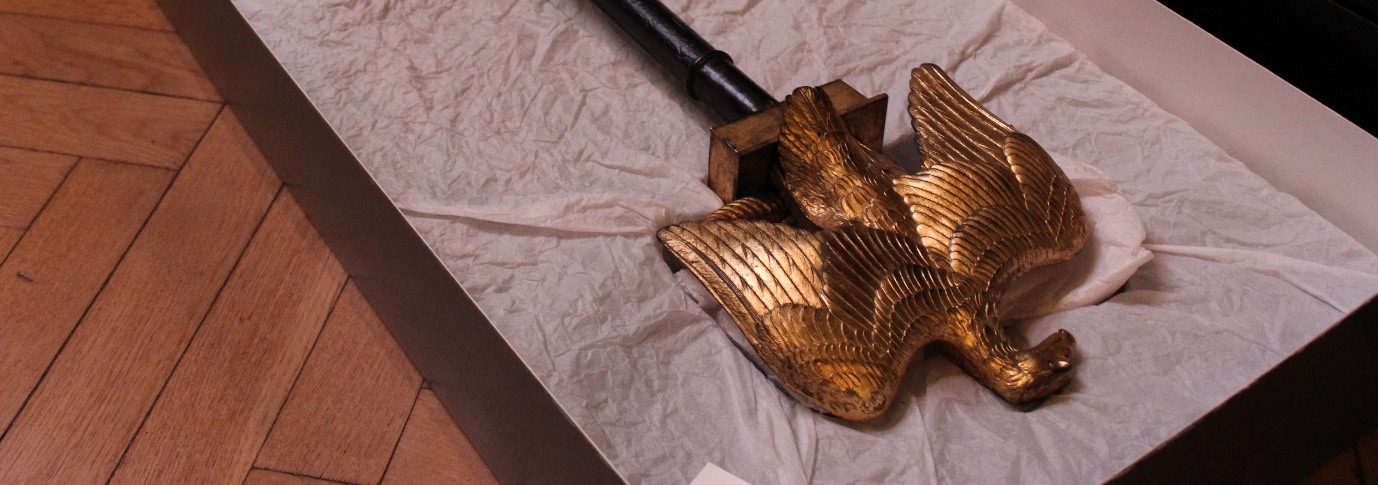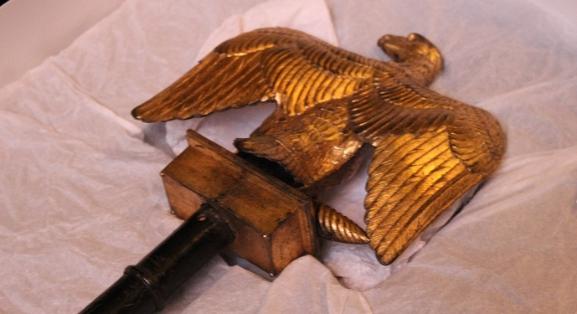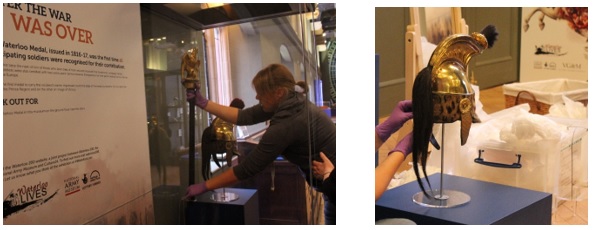On this day in 1815 - The Battle of Waterloo changed the course of European History.
Posted on: 18 June 2021 by Leonie Sedman, Curator of Heritage & Collections Care in 2021

This picture represents one of the most exciting moments I have ever experienced as a museum curator. In 2015, as part of the National Army Museum’s partnership project in commemoration of the bicentenary of the Battle of Waterloo, we exhibited a selection of artefacts from their Waterloo Collections. I had successfully negotiated the loan of one of only two Napoleonic Eagle Standards captured by the British at that battle (and I confess to having been shamelessly pleased with myself).
Unless you work at a National museum such as the British Museum (or indeed, the National Army Museum) you rarely get to come face-to-face with something that has actually been part of a pivotal moment in history.
An idle Google search ‘what if Napoleon had won at Waterloo’ produced nearly three million results - so - for very many people the result of the battle is deemed to have had far reaching effects. There are those who even suggest that if Napoleon had won, the two world wars might never have happened (at least not those particular wars).
Waterloo had such influence that - together with its larger than life leading characters - it has weaved itself into the fabric of our shared culture - over 200 years later.

Bill & Ted’s Excellent Adventure Blackadder the Third: Duel and Duality
You might not personally know anything about the Battle of Waterloo – but it is likely you will have heard the Abba song - or seen the episode of Blackadder featuring Stephen Fry as the Duke of Wellington - wondered why Napoleon was so competitive in Bill & Ted’s Excellent Adventure - watched Sean Bean in Sharpe’s Eagle - or caught a train from Waterloo Station?
Napoleon’s defeat at Waterloo ended his imperial ambitions - but helped to pave the way for British imperial ambitions (one evil exchanged for another perhaps?)

This beautiful object was actually present at Waterloo. One of the most important battles that ever took place on European soil.
The VGM was approached to take part in the National Army Museum’s ‘Waterloo Lives’ project because we are the custodians of the University of Liverpool’s Dental School Museum Collection - which includes one of the best collections of ‘Waterloo Teeth’ in the world.
‘Waterloo Teeth’ are dentures made from human teeth. This was considered a huge improvement in quality from the carved elephant or hippo ivory that had previously been used.
 Waterloo Teeth on Display (desk cabinet) at the VGM
Waterloo Teeth on Display (desk cabinet) at the VGM
But - there was just one problem. In order for someone to be able to obtain a set of ‘natural’ teeth – the teeth first had to be removed from another, less-fortunate individual. It seems that the dentists (and indeed the recipients of the teeth) had very little care whether the donor of the teeth happened to be alive or dead. In some cases, the poor would sell their teeth, often to be implanted directly into a wealthy person (along with syphilis or any of a number of other contagions) without anaesthetic of course. Another supply was from the bodies of paupers or executed criminals. But by far, the most favoured supply was from the bodies of the young healthy soldiers who had died on the battlefield. The moniker ‘Waterloo Teeth’ came about because that battle provided such a massive supply of raw material for the dentures.
This is the part of the story that illustrates to us - the real horror of the supposedly glorious theatre of war.
Contemporary accounts tell us of witnesses who had to walk away to be sick after seeing the carnage the day after the battle.
Yet, amongst this nightmare, people looking for profit were stalking the battlefield with pliers – removing healthy teeth to be sold to dentists in England. Even more horrifying, the recipients of the resulting dentures were happily thinking that they were wearing teeth from the fallen enemy - when in reality, they were just as likely to be wearing the teeth of a fallen countryman.
Despite the beauty of the Napoleonic eagle, it should serve as a reminder to us all - of the futility and the horror of war.

National Army Museum Curators installing the exhibition in 2015
A century after Waterloo - this idea was eloquently expressed by another young man whose life was wasted in a war not of his making:
"The old lie: Dulce et decorum est
Pro patria mori."
(It is sweet and proper to die for one's country).
Wilfred Owen 1893-1918
Links:
https://www.chroniclelive.co.uk/news/north-east-news/200th-anniversary-battle-waterloo---9476778
https://poets.org/poem/dulce-et-decorum-est
Keywords: Waterloo, Battle of Waterloo, National Army Museum, Eagle Standard, Waterloo Teeth, Napoleon’s 105th Regiment , Napoleon, Museum.